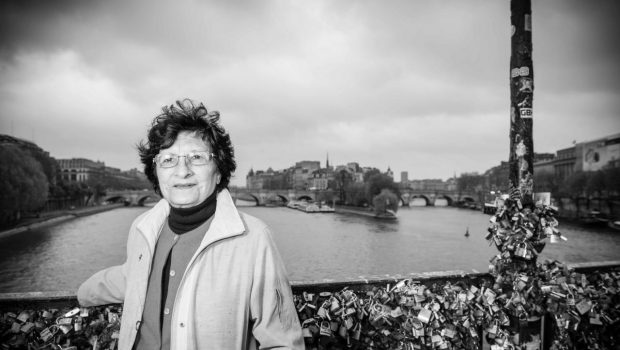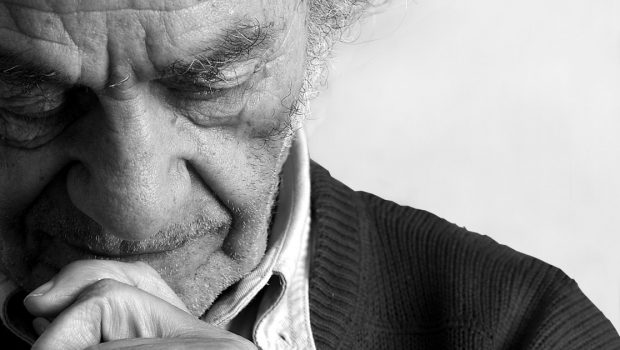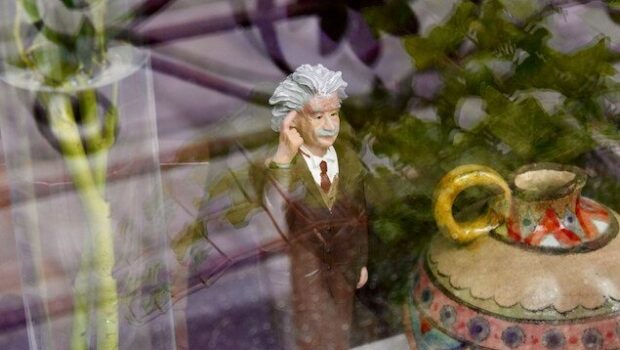Watching
Ver
Tununa Mercado
Translated by Rhonda Dahl Buchanan
Watching
For the past six years, every afternoon between seven and eight in the evening, a young woman enters her apartment in the Village of New York City. The last building of a nineteenth-century apartment house, on Tenth Street between Sixth and Fifth – right across from the house where Mark Twain once lived – provides the perfect vantage point to behold the arrival that marks the end of the work day. From there, the angle is so propitious that one might speculate that each window, that of the gazer and that of the young woman, have been deliberately aligned, one exactly across from the other. The spectacle occurs as much in winter as in spring or fall, but is never the same even though the essential elements do not vary. The scenery framing the windows does change: at times the spectator watches from a window adorned with flowering wisteria and observes the woman framed like a cameo by small white blossoms, while other times, only a few gnarled branches and icicles surround the lustrous transparency of each window pane.
It is best to be there by seven in order to watch her. If the observer is late and takes his seat after she has arrived, he misses the sudden rush of seeing her appear in the doorway of her bedroom. To gaze at her in comfort, he must turn off the lights shortly before her arrival, and position himself in the center of the observation space, in this case, the living room of a nineteenth-century apartment. It is important to note that dim light is the only condition for observation, and that the semi-darkness should not be disturbed until after she has succumbed to slumber, at which time he may turn on the lights and resume his normal activities.
Observing her is, therefore, a decision that must be made in advance, with the same attention to detail required of a job. If one afternoon, for example, the observer should decide to spend the viewing hour doing something else, he need only close the blinds, turn on the lights, and make a concerted effort to disregard the scene taking place across the street.
She arrives, removes her hat, gloves, shoes, and takes off her sweater and blouse. Seated at the foot of the bed, her torso bare and her skirt still on, she struggles to unfasten the garter belt, then finally decides to take off the skirt, and with the skill of someone familiar with that article of lingerie, she releases the stockings from the garter belt and slips out of them as if lifting a veil. She never wears panties. She leaves everything in disarray, lights a cigarette, and leaves the room. As usual, she does not stay in the room, but goes in and out performing various acts, such as serving herself a drink, going in and out two or three times to see if the tub has filled (activities that can only be imagined: the sound of running water cannot be heard, neither can the ice clinking against the sides of the glass, or the music she listens to, which can only be conceived by the rhythmic undulation of her hips and shoulders, or the beat marked by her swaying breasts). While she takes a bath, her disappearance from the scene feels like an intermission, a suspension of action that turns the attention to the familiar objects in the room: the lamp on the night stand, the bed against a white wall, cushions, and the dresser on which she tends to lay her gloves, hat or purse when she arrives from outside. Aside from the bed linens, there is nothing in that room for covering up from the cold, from breezes or drafts, or from peering eyes. The square glass of the window, surrounded by its bright blue frame, is open or closed, depending on the outside temperature, but never to protect her from sunlight, or the night, or from any other circumstance; in fact, very few times is it open to let in fresh air, nor does it seem that she has ever thought of occupying her mind, body, or bedroom in any kind of domestic chores.
After her bath, she returns naked, with only a towel wrapped around her head. For several years, that clean body, which displays itself with audacity and at the same time innocence, has shown very few changes, but if one is worth mentioning it is her beauty that continues to grow as if her body were blessed by a mysterious capacity to become increasingly more voluptuous, as much for its harmonious silhouette as its assertive movements. A tuft of hair extends from her pubis nearly to her abdomen, and seems to be a thick and red, crying out to be caressed. She runs her fingers through the ringlets of her pubis, in the opposite direction of their natural growth, straightening an unruly swirl or stretching the locks to their end, as if playing with a head of hair.
The bed is the site for her body. During that preliminary stage, she may turn full circle in the room, and before finally lying on the bed, admire herself in a mirror (there must be one, on the wall by the window that cannot be seen, given that she strikes poses that duplicate the image of herself repeated somewhere in the room and creates figures with her arms and legs that only make sense if they are reflected by something). Her movements– generous for the spectator– seem to be an evaluation of some sort: of a solitary condition, of the call that will open that intimate space to the outside world, of the interlude that will last for hours until sleep sets in, of that dreamlike state that will envelop the last moments of the encounter with herself, of the imaginary tools that could, this time– and there is always a “this time” understood as a survival tactic– lavish her with the ultimate passion.
In the top floor apartment across the street, the observer has not taken any special steps to respond to the appearance of that naked woman who strips away the towel, the last vestige tying her to civilization, that provisional turban, which once concealed her wet auburn locks, now free, grazing her forehead, curling round her ears and neck. He is suspended in that time and space by his own choice, and partakes of that daily bread not only because it is his sustenance, but because that simple act of watching someone who lets herself be watched has become a type of operation whose extractions and additions provide infinite variations, even though its frame of reference is confined to the square of a room with a window on Tenth Street.
During the first years, he had resisted daily contemplation. That repetition of an act at a precise hour dictated his entire day. He lived for the moment he could go home, settle in, and gaze. Convinced that the vision of the woman had caused him irreparable damage, he forced himself not to watch her, inventing obligations at the exact hour she arrived, or worse yet, restraining his eyes and subjecting them to a torture that could be, depending on the magnitude of desire to watch that would overpower him, the methodical reading of a book, the kind of reading that calls for taking notes or creating files, incarcerating readings to temper the vocation of gazing through the window to the other window.
It is not that he had surrendered, once and for all, and in a submissive way, to the ceremonial afternoon enchantment. After the period of prohibitions, he came to the realization that they actually fueled his desire: if one afternoon he had forced himself to avoid the view, the very thought that the next day that deprivation was going to be rectified produced an accumulating effect on him, as if waiting for a day charged even more the urge to watch, as if it sharpened his gaze, his capacity to observe, his ability to focus, and the throbbing of his senses reached, after the sacrifice of the previous evening, its highest point.
She spreads her legs and stretches out on the fresh sheet, displaying her sex. The light is not too bright, but enough to see vividly. Her head is lower than her sex, as if she had slipped a cushion under her buttocks to give the observer the perfect angle of view. Her sex in the center of the scene, completely exposed between two columns, like a hearth lit by a tribe, a bird nest, a burning bush, or a sanctuary, makes him close his eyes, nearly blinding him with a blaze momentarily abstracted from the flesh and body, from the girl and even from the feminine condition. His eyes aligned at the exact level of her open and beckoning sex take a long time to readjust to reality. Surreptitiously, he lets the head of his penis peek out of his open fly. He tests the state of his erection and verifies that it has that optimum flexibility and texture, partially expressed, an indefinite state like the delicate sensation that begins to invade him.
The living room gets darker as the afternoon slips away and the evening draws near. The dim light in his room contrasts with the radiant glow of the room across the street. She lifts her legs, then crosses and uncrosses them. Suddenly, he notices that she picks up the telephone and that, oblivious to the commotion that her sex is provoking in the center of the stage, on the bed and between her legs, she repositions herself on a pillow, placing another cushion at the nape of her neck, letting her head and nipples appear between her open legs. She talks on the phone, with ease. She laughs, holding the receiver in her right hand and, with the other, begins to touch her legs, her belly, rolling to the right, then to the left. Her sex disappears between her legs, and then the curve of her ass comes into view. Her hands have the golden touch, always obtaining what they desire by design, without idle fondling. It may seem a careless caress that now inserts a finger into the deep crack of her buttocks. One might think the drumming of fingers is just a way of scratching herself, but no, even when she is talking on the phone, those hand movements are not accidental and each one provides a brief and intense moment of ecstasy. When the exaltation is too powerful, she covers the speaker, most likely so that her breathing, which becomes more and more agitated, cannot be heard.
He knows that phone call is not isolated from the scene. Supposedly that voice is giving her suggestions that suit perfectly the situation of nudity and solitude that performs its various compositions and arranges its figures on the bed, between seven and eight, on Tenth Street. The call has been made regularly throughout all those years, ever since he began to observe and enjoy the scene. When it was not made, she seemed to become desperate, but did nothing to rectify the situation. She did not call, and to mitigate the frustration, her performance turned more narcissistic than ever and the devotion to herself reached a fever pitch too unbearable for him to contemplate, as if his observation post and routine of gazing had imploded, overwhelmed by the circumstances.
She puts down the phone. A temporary pause, while she tends to the urgent need she feels to use both hands. She opens her legs again, picks up the receiver, says something, smiles, laughs out loud, places the speaker on her sex, almost as if she were inserting it into her vagina, but no, that is not the case, it is perhaps just the idea of letting her listener hear the sound of her lips opening and closing, or to invaginate the voice of the speaker, or to muffle it between that tuft of hair. Her dried locks are a dazzling cascade over that body delighting in gratification, which if it could lick itself completely, would not be licking the edges of the speaker at this very moment, or sucking on chips of ice, or wetting fingers to caress her sex.
His penis has gone from a state of flexibility to absolute stiffness. It is a weapon that points directly at the multiple mouths of the girl, loaded and cocked, and ready to fire, but the discipline of self-restraint he has exercised for years and whose objective has been to coordinate the amorous explosion, synchronizing it perfectly with the explosion that just a street away will erupt, keeps his erection at bay like an animal about to pounce. She seems to shout something, almost howling, her body convulsing as if it had reached a point of no return, and then collapses, vanquished. At that moment, the penis, on the other side of the street, overflows like a fountain, on its own, without any hand or stimulus forcing it to do so, from the mere concentrated effort of contemplation. The observer closes his eyes serenely, and before hanging up the phone, listens to the harmonious breathing of someone who has fallen asleep, soon after turning off the light.
- “Watching” from the Mirages Section of Chamber Canon Translated by Rhonda Dahl Buchanan. The book can be purchased here
 Tununa Mercado (Córdoba, 1939 has earned a reputation as one of Argentina’s most acclaimed contemporary writers. She is also a journalist and translator from French to Spanish. Her novel Yo nunca te prometí la eternidad (2005) received the 2007 Sor Juana Inés Prize and Canon de alcoba received the 1988 Boris Vian Prize and has been published in subsequent editions and translations. Her other works include, among others: En estado de memoria (1990), La letra de lo mínimo (1994), La madriguera (1996), Narrar después (2003).
Tununa Mercado (Córdoba, 1939 has earned a reputation as one of Argentina’s most acclaimed contemporary writers. She is also a journalist and translator from French to Spanish. Her novel Yo nunca te prometí la eternidad (2005) received the 2007 Sor Juana Inés Prize and Canon de alcoba received the 1988 Boris Vian Prize and has been published in subsequent editions and translations. Her other works include, among others: En estado de memoria (1990), La letra de lo mínimo (1994), La madriguera (1996), Narrar después (2003).
 Rhonda Dahl Buchanan is a Professor of Spanish and Director of Latin American and Latino Studies at the University of Louisville. She has published translations of fiction by the Argentine writers Ana María Shua and Perla Suez, and by the Mexican writer Alberto Ruy Sánchez. Her translation, The Secret Gardens of Mogador, by Alberto Ruy Sánchez, received an NEA Literature Fellowship in 2006, and chapters of the novel have been published in Literal.
Rhonda Dahl Buchanan is a Professor of Spanish and Director of Latin American and Latino Studies at the University of Louisville. She has published translations of fiction by the Argentine writers Ana María Shua and Perla Suez, and by the Mexican writer Alberto Ruy Sánchez. Her translation, The Secret Gardens of Mogador, by Alberto Ruy Sánchez, received an NEA Literature Fellowship in 2006, and chapters of the novel have been published in Literal.
Todas las tardes, entre las siete y las ocho de la noche y desde hace seis años, una muchacha llega a su departamento, en el Village de Nueva York. Desde el último edificio de una casa de departamentos del siglo diecinueve, en la Diez entre la Sexta y la Quinta –justo en la vereda de enfrente de la casa donde viviera Mark Twain– se puede asistir perfectamente a esa llegada y a ese final de jornada. Desde allí es tan propicio el ángulo de mira que podría llegar a suponerse que una y otra ventana, la del mirador y la de la muchacha, han sido encuadradas exactamente una frente a la otra ex profeso. La exhibición sucede tanto en invierno, en primavera como en otoño; nunca es la misma a pesar de que no cambien los elementos con que se constituye. El marco que rodea las ventanas varía: a veces el espectador mira desde una ventana cubierta de glicinas florecidas y la muchacha es observada con una marialuisa de rosetas blancas; otras, solamente unas ramas retorcidas y unas agujas de hielo enmarcan la luminosa limpidez del vidrio de una y otra ventana.
Para verla es mejor estar desde las siete; si el observador se retrasa y se instala después que ella ha llegado, se pierde el sobresalto de su aparición en el vano de la puerta de su cuarto. Para mirarla con comodidad hay que apagar las luces un rato antes, situarse en el centro del espacio de observación, en este caso la sala de un departamento del siglo diecinueve. La penumbra es la única condición para mirar, pero debe saberse que esa penumbra no debe ser interrumpida y que sólo se está en libertad de encender la luz y de reiniciar la vida ordinaria cuando ella se haya entregado al sueño.
Mirar a la muchacha es, pues, una decisión que hay que tomar por anticipado, aplicándose a ella como a un trabajo. Si una tarde, por ejemplo, el observador decidiera ocupar el tiempo de la observación en cualquier otra cosa, sólo tendría que correr los visillos, encender normalmente la luz y, mediante un esfuerzo de concentración, prescindir de la escena que tiene lugar calle de por medio.
Ella llega, se quita el sombrero, los guantes, los zapatos; se saca el suéter, la blusa. Sentada al borde de la cama, con el torso desnudo y con la falda puesta, trata de desprenderse infructuosamente el portaligas; finalmente decide quitarse la falda y, con la pericia de quien está acostumbrada a ese tipo de prenda, suelta las medias del portaligas y se las saca como si se quitara un velo. Nunca lleva calzones. Deja todo en desorden, prende un cigarrillo, sale de la habitación. Como de costumbre, no se instala definitivamente en el cuarto, sino que entra y sale cumpliendo diversos objetivos, como buscarse un vaso de algún alcohol, ir y venir en dos o tres momentos para verificar si la tina ya se llenó (estos trajines sólo pueden adivinarse, el ruido de la salida del agua no se puede oír, tampoco el tintinear del hielo contra las paredes del vaso, ni la música que escucha, que sólo puede suponerse por el ritmo con que ella la acompaña con sus caderas y sus hombros o por el compás que le marca la oscilación de sus pechos). Durante el tiempo que dura el baño, su desaparición de la escena crea una atmósfera de entreacto, de suspensión de la acción que obliga a detenerse en los objetos y a reconocerlos: lámpara sobre una mesa de luz, cama pegada al muro blanco, cojines, una cómoda sobre la que ella suele depositar sus guantes, su sombrero o su bolsa al llegar de afuera. Salvo la ropa de cama, no hay en ese cuarto nada previsto para cubrirse, ni del frío, ni de las brisas o corrientes de aire, ni de las miradas; el cuadrado de vidrio de la ventana, con sus bordes nítidamente azules, es abierto o cerrado por razones de temperatura ambiente, pero nunca para protegerse de la luz del sol, ni de la noche, ni de ninguna otra circunstancia; incluso, muy pocas veces es abierto para ser aireado y no parece que la muchacha haya pensado nunca en ocupar su cabeza, su cuerpo o su recámara en tareas de índole doméstica.
Cuando regresa del baño ella viene ya desnuda y sólo con una toalla enrollada a su cabeza. En varios años ese cuerpo limpio que se muestra al mismo tiempo con desparpajo e inocencia no ha tenido muchas variaciones, y si alguna puede admitírsele es su belleza siempre en aumento, como si estuviera dotado de una misteriosa capacidad de ser cada vez más pleno, tanto por la armonía de sus contornos como por la seguridad de sus movimientos. La mata de pelo de su pubis se extiende casi hasta la mitad del vientre y pareciera ser rojiza, espesa, y llamar a la caricia. Ella se dedica a pasear sus dedos entre los bucles de su pubis, desafiando el sentido de su crecimiento, corrigiendo un remolino irredento o estirando en todo su largo los mechones, como quien juega con una cabellera.
La cama es el sitio de su cuerpo; podrá girar cien veces en redondo por el cuarto, mirarse en un espejo (ha de haberlo, en la pared junto a su ventana, la que no se ve, pues ella toma actitudes que se corresponden con su imagen repetida en alguna parte y crea figuras con sus brazos y piernas que solamente tienen sentido si se reflejan en algo) en ese tránsito preparatorio, pero terminará por tenderse en la cama. Sus desplazamiento –generosos para el espectador–– parecen ser una suerte de evaluación: de la situación de soledad, del llamado que va a abrir ese espacio íntimo hacia el exterior, del interludio que va a prolongarse unas horas hasta que el sueño venga, del estado de ensoñación que va a envolver los últimos momentos del encuentro consigo misma, del instrumental imaginario que podrá, esta vez ––y siempre hay un “esta vez” entendido como estrategia de vida– prodigarle la máxima emoción.
En el departamento del último piso de enfrente el observador no ha tomado ninguna medida especial correlativa a la aparición de esa muchacha desnuda que se despoja del último elemento que la ataba a la civilización, el circunstancial turbante de toalla, que ahora deja en descubierto sus cabellos mojados y rojizos, en libertad, pegados a la frente, enrulándose apenas sobre las orejas y el cuello. Él está detenido en ese tiempo y en ese espacio a voluntad, come de ese pan no sólo porque es su alimento cotidiano, sino porque ese acto simple de ver a alguien que se deja mirar ha terminado por convertirse en una especie de operación que por sus extracciones y sus adiciones podría ser infinita, aunque su marco de contención se reduzca al cuadrado de una habitación con una ventana a la calle Diez.
En los primeros años se había resistido a la contemplación diaria. Esa reiteración del acto a una hora precisa condicionaba toda su jornada. Sólo esperaba llegar a su casa, instalarse y mirar. Convencido de que la imagen de la muchacha le había producido un daño irreparable, se obligaba a no verla creándose obligaciones justo a la hora en que la muchacha llegaba o, peor aún, reprimía su mirada sujetándola a un suplicio que podía ser, según la magnitud del deseo de ver que de él se apoderara, la lectura metódica de un libro, de ese tipo de lecturas que reclama tomar notas o hacer fichas, lecturas-cárcel para dominar la vocación de ver a través de la ventana hacia la otra ventana.
No es que se hubiera entregado, de una vez y para siempre, a la ceremonia y al sortilegio de las tardes, y de una manera sumisa. Después del período de las prohibiciones, había terminado por darse cuenta de que ellas mismas eran una fuente de alimentación: si una tarde se había forzado en eludir la contemplación, la sola idea de que al día siguiente esa omisión iba a ser reparada, tenía en él un efecto de acumulación, como si la espera del otro día lo cargara aún más de ganas de ver, como si la agudeza de su mirada, su capacidad de observar, su estado de atención y la vibración de sus sentidos llegaran, luego de la privación de la víspera, a su punto más alto.
Sobre la pura sábana ella se extiende con las piernas separadas, enseñando su sexo. La luz no es demasiado fuerte, pero permite ver con nitidez. Su cabeza está más abajo que el sexo, como si algún cojín hubiera levantado sus nalgas hasta el ángulo exacto de mira del observador. El sexo en el centro de la escena, así expuesto, entre dos columnas, como un hogar encendido por la horda o como un nido de pájaros, o como una zarza de fuego, o como un sagrario, lo obliga casi a cerrar los ojos, enceguecido por una llamarada que momentáneamente se hubiera abstraído de la carne y del cuerpo, de la muchacha y hasta de la condición femenina. Sus ojos exactamente a la altura del sexo abierto y dispuesto tardan en reacomodarse a la realidad. Él deja aparecer, subrepticiamente, por su bragueta abierta, la cabeza de su pene. Palpa su estado de erección y verifica que tiene esa flexibilidad y textura óptimas, a mitad del crecimiento, a media expresión, estado indefinido, como la delicada sensación que comienza a invadirlo.
La sala está cada vez más a oscuras a medida que avanza la tarde y se acerca la noche. A la penumbra de su cuarto se corresponde la luminosidad del cuarto de enfrente. Ella levanta sus piernas, las cruza, las descruza. De pronto, él advierte que ha echado mano al teléfono y que, muy lejos de la conmoción que su sexo está produciendo en el centro de la escena, sobre la cama y entre las piernas, se reacomoda sobre un cojín, coloca otro más en su nuca, dejando aparecer, también entre las piernas abiertas, su cabeza y el par de pezones de su pecho. Ella habla por teléfono. Simplemente. Se ríe, con la mano derecha sostiene el tubo y, con la otra, empieza a tocarse las piernas, el vientre; gira hacia la derecha, gira hacia la izquierda; su sexo se pierde entre las piernas, pero aparece en cambio la comba del culo. Sus manos han sido siempre sobadoras, pero no en vano, sino con una clara noción de lo que quieren obtener. Puede parecer una caricia distraída la que ahora imprime su dedo en la profunda hendidura de sus nalgas, puede pensarse que ese tamborileo es sólo una forma de rascarse, pero no, aun cuando ella siga hablando por teléfono, esos movimientos de manos no son gratuitos y, cada uno, le provoca un breve, intenso éxtasis. Cuando la exaltación es demasiado fuerte, tapa la bocina, seguramente para que no se oiga su respiración,cada vez más agitada.
Él sabe que esa llamada tampoco está separada de la escena. La voz, es de suponer, le está diciendo propósitos que se convienen perfectamente con la situación de desnudez y de soledad que muestra sus diferentes cantos y dispone sus figuras sobre una cama, entre las siete y las ocho, en la calle Diez. La llamada se ha producido regularmente en todos estos años, desde que él observa y goza. Cuando falló, ella pareció desesperarse, pero no hizo nada para subsanar la falta. Ella no llamó y, para paliar la frustración, su acto fue más solipsista que nunca y la devoción por sí misma llegó a un paroxismo tal que a él terminó por serle insoportable, como si su puesto de mira y su acción de mirar hubieran estallado, sobrepasados por los acontecimientos.
Ella deja el teléfono. Se trata de pausas, de la necesidad perentoria que la atraviesa de usar sus dos manos. Abre nuevamente las piernas, recupera el auricular, dice algo, sonríe, ríe a carcajadas, y se coloca la bocina en el sexo, casi se podría pensar que se la introduce en la vagina, pero no, no es eso, es tal vez solamente la idea de hacer oír a su interlocutor el ruido de sus labios que se cierran y se abren, o para envaginar la voz de quien habla, o para acallarla entre la mata de pelo. Sus cabellos se han secado y son un resplandor en ese cuerpo que rueda en la disipación y que, si pudiera lamerse en su totalidad, no estaría ahora lamiendo los bordes del tubo ni chupando pedazos de hielo, ni ensalivándose los dedos para acariciarse el sexo.
El pene ha pasado de la flexibilidad a la turgencia plena. Es como un arma que apunta directamente a las múltiples bocas de la muchacha. Su poder de fuego está concentrado y pugna por salir pero el ejercicio de autocontención a que ha sido sometido durante años y cuyo objeto ha sido disciplinar el estallido amoroso sincronizándolo perfectamente con el estallido que, calle de por medio, va a producirse, lo mantiene en su erección, como un animal a punto de dar el salto. Ella parece gritar algo, aullar casi, su cuerpo se conmueve como si hubiera llegado a un sitio del que no pudiera retornar, y luego cae vencido. En ese momento, el pene, al otro lado de la calle, se derrama como una fuente, solo, sin que ninguna mano o estímulo le exija hacerlo: por la pura y estricta fuerza de la contemplación. Serenamente, el observador cierra los ojos y, antes de colgar el tubo del teléfono, oye una respiración armónica, de alguien que acaba de dormirse, luego de apagar la luz.
- “Ver” pertenece a la sección de Espejismos del libro Canon de alcoba.
 Tununa Mercado (Córdoba, 1939) es una de los escritores contemporáneos argentinos más reconocidos. También es periodista y traductora. Su novela Nunca te prometí la eternidad recibió el Premio Sor Juana Inés de la Cruz en 2007. Canon de alcoba recibió el Premio Boris Vian en 1988 y ha sido publicado en subsecuentes ediciones y traducciones. Otras obras suyas incluyen, entre otros: En estado de memoria (1990), La letra de lo mínimo (1994), La madriguera (1996), Narrar después (2003).
Tununa Mercado (Córdoba, 1939) es una de los escritores contemporáneos argentinos más reconocidos. También es periodista y traductora. Su novela Nunca te prometí la eternidad recibió el Premio Sor Juana Inés de la Cruz en 2007. Canon de alcoba recibió el Premio Boris Vian en 1988 y ha sido publicado en subsecuentes ediciones y traducciones. Otras obras suyas incluyen, entre otros: En estado de memoria (1990), La letra de lo mínimo (1994), La madriguera (1996), Narrar después (2003).
 Rhonda Dahl Buchanan es Profesora de Español y Directora del Programa de Estudios Latinoamericanos y Latinos en la University of Louisville. Ha publicado traducciones de obras narativas de las escritoras argentinas Ana María Shua y Perla Suez y del escritor mexicano Alberto Ruy Sánchez. Su traducción, The Secret Gardens of Mogador, una novela de Alberto Ruy Sánchez, ganó una beca de la NEA en 2006 y capítulos de la novela han sido publicados en Literal.
Rhonda Dahl Buchanan es Profesora de Español y Directora del Programa de Estudios Latinoamericanos y Latinos en la University of Louisville. Ha publicado traducciones de obras narativas de las escritoras argentinas Ana María Shua y Perla Suez y del escritor mexicano Alberto Ruy Sánchez. Su traducción, The Secret Gardens of Mogador, una novela de Alberto Ruy Sánchez, ganó una beca de la NEA en 2006 y capítulos de la novela han sido publicados en Literal.










